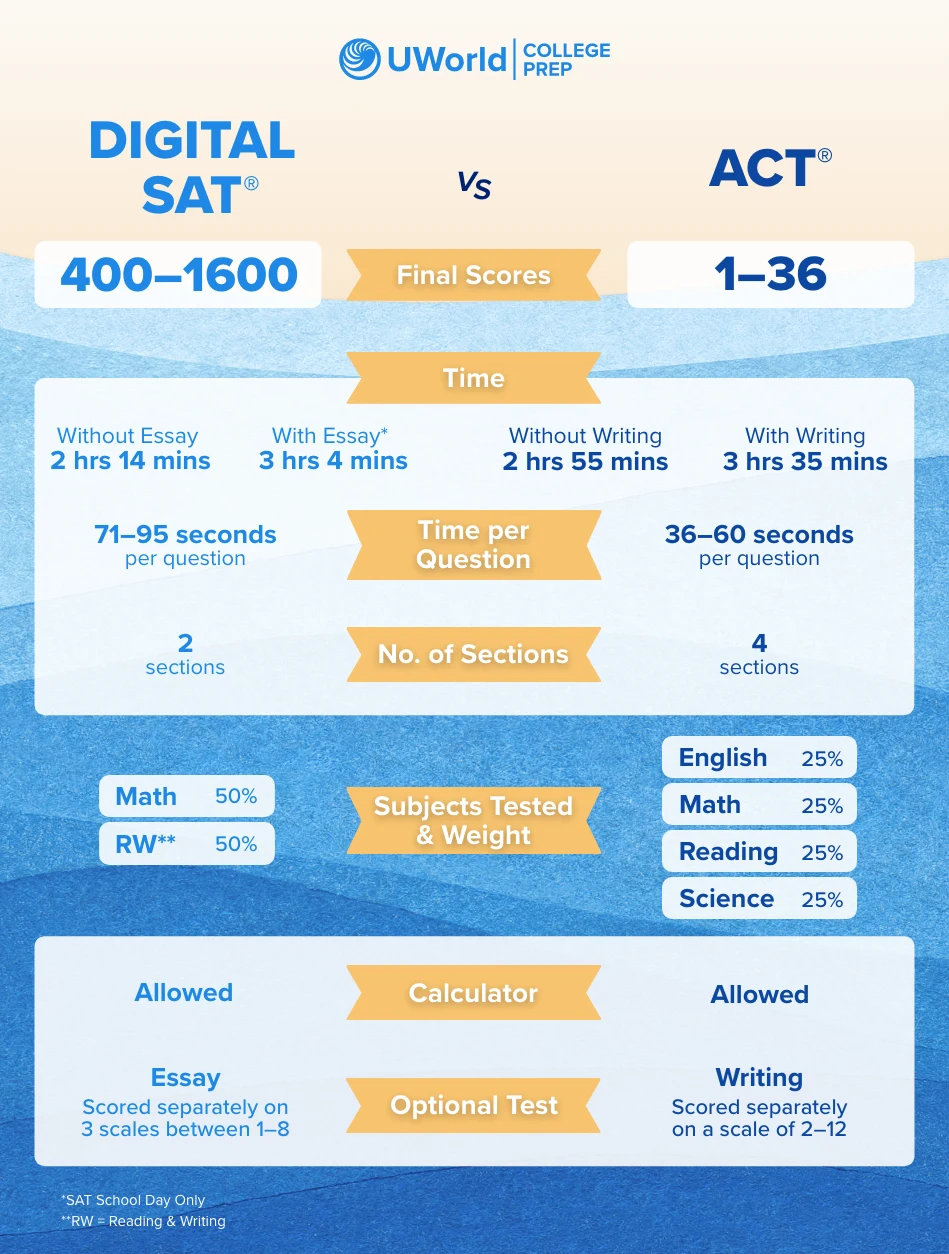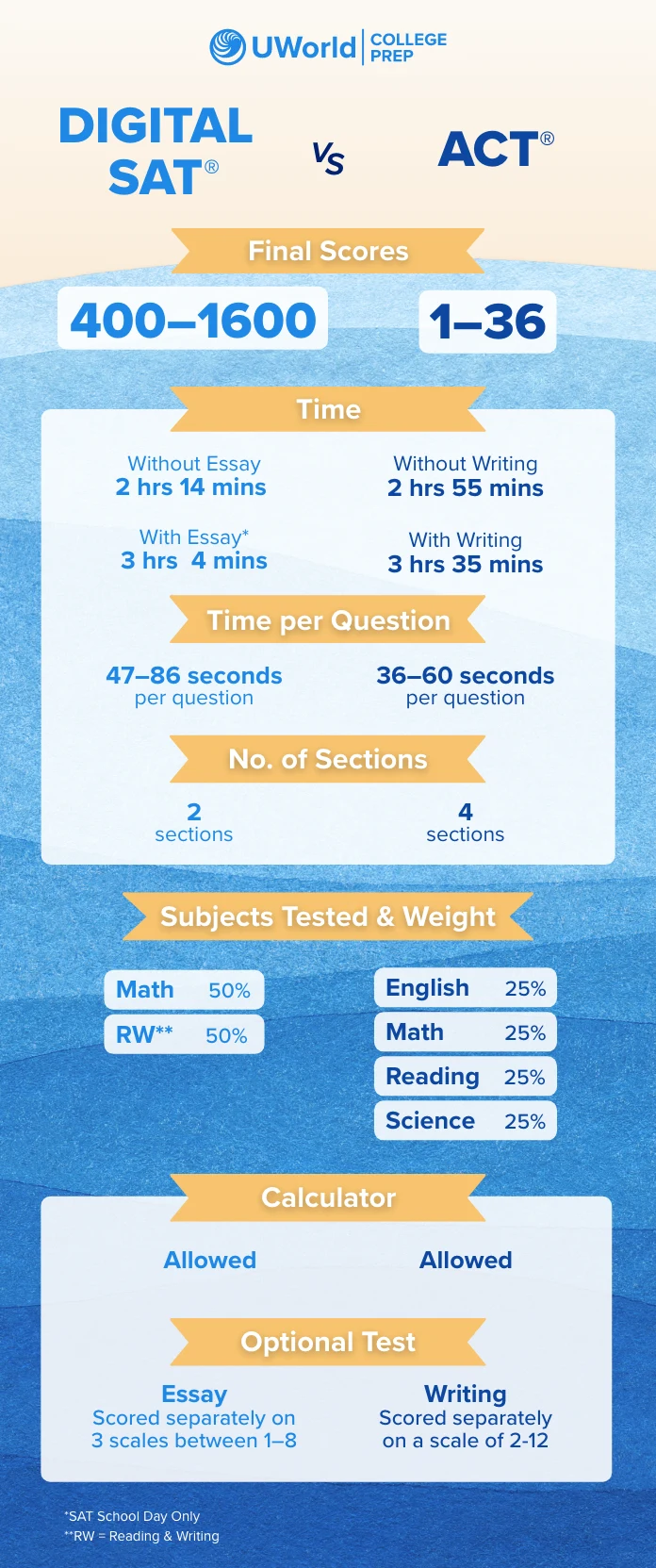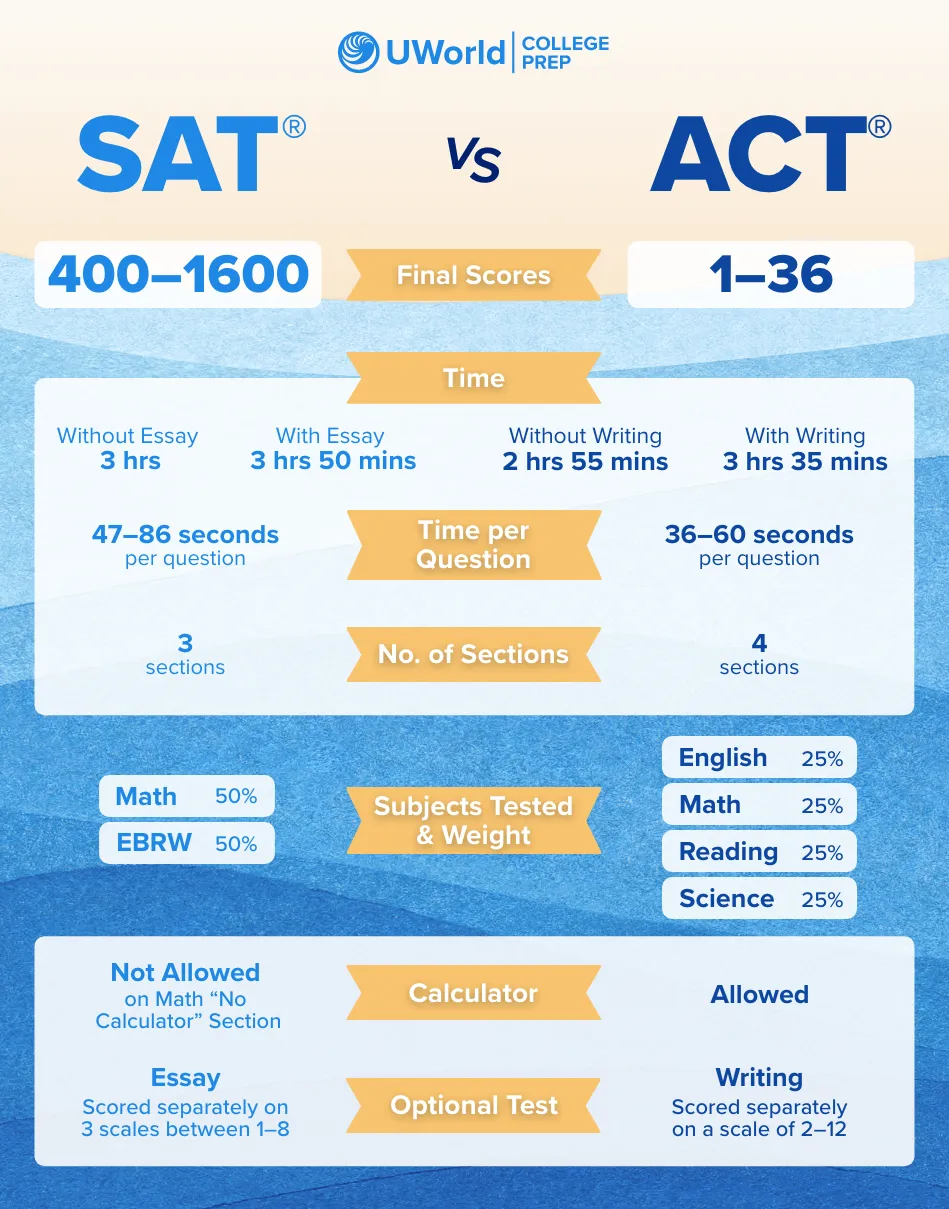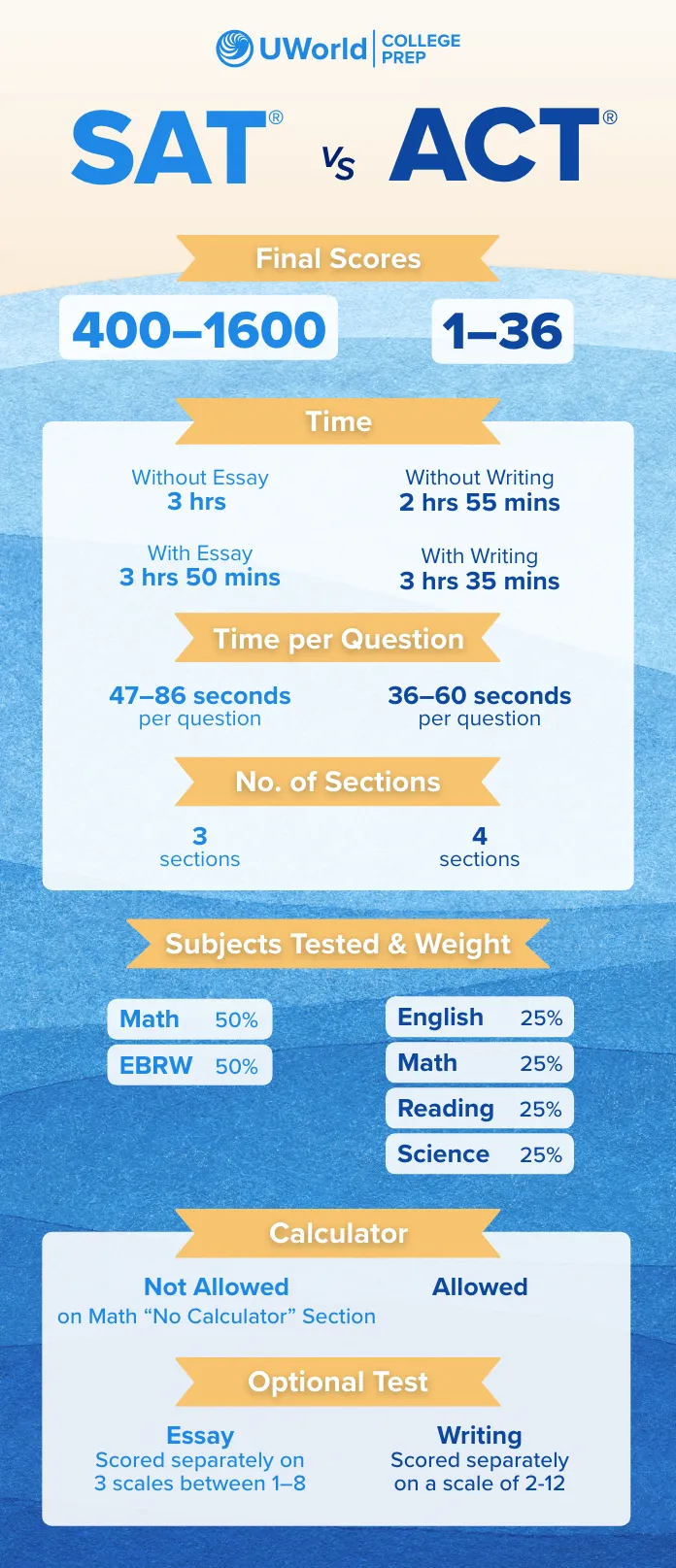Digital SAT® vs ACT®
Which Test To Take
The Digital SAT® and ACT® are similar tests in many ways. For example, both are standardized, timed tests used in college admissions processes across the United States. While they emphasize different skill sets and subject areas, these two tests are equally recognized as benchmarks of college readiness. In 2018, of the 4 million students who took the ACT and/or SAT exams, 1.9 million took the ACT, and 2.1 million took the SAT; about 40% of students took both.
However, there are several key differences between these tests. Students frequently ask whether the SAT is more important than the ACT or vice versa or whether they can take both tests. So, in this article, we will answer all your questions about the ACT vs SAT debate!
What Is the Difference Between the ACT, SAT, and Digital SAT?
Both of these tests are widely recognized for undergraduate admissions to colleges. Choosing one test over the other—or taking both tests—depends on what your academic aptitude and goals are. To help you decide, let’s discover the significant differences between the Digital SAT, the ACT, and the discontinued paper SAT:
The Digital SAT is scored on a scale of 800-1600, while the ACT is scored on a scale of 1-36. But, unlike the ACT, the Digital SAT uses adaptive testing through modules. The test duration is also comparatively shorter on the SAT, reducing the test-taking time by more than 1 hour and 15 minutes. However, the time offered per question on the Digital SAT (71-95 seconds/question) is more than the ACT (36-60 seconds/question). In terms of subject areas tested, the ACT has a separate Science section. By the way, did you know? You can use a calculator throughout the Math section for both tests!
Additionally, the Digital SAT is based on adaptive testing technology, which generates questions based on your performance on the previous set of questions. This lets administrators get a better idea of the student’s academic and analytical knowledge and skills.
Check out the infographic below to learn how the Digital SAT differs from the ACT:


If you’re curious to learn the differences between the ACT and the discontinued paper-and-pencil SAT, check out the infographic below. Both tests offer a similar duration, but the ACT covers one more subject, Science. However, the time per question on the ACT is less (36-60 seconds/question) compared to the paper SAT (47-86 seconds). Additionally, calculators were restricted to a portion of the paper-and-pencil SAT Math section, whereas calculators can be used on the entire ACT Math section.


Should I Take the ACT or the Digital SAT?
Each test requires a different strategy, so the best way to know which one to take is to look at sample ACT and Digital SAT tests. Moreover, acquainting yourself with the topics covered on each assessment will give you a good idea of how each test can help you achieve your career goals. Some students even opt to take both to see how their scores compare. In the following passages, we will address which of these two tests could be the right fit for you in terms of content and strategies.
Content
- The Digital SAT tests more vocabulary and analytical knowledge than the ACT.
- Math makes up 50% of the SAT score but only 25% of the ACT score.
- Math on the ACT covers more higher-level skills, including geometry and trigonometry.
Skills
- What kind of a reader are you?
Are you a slow reader? Or do you love reading all kinds of books, have a great vocabulary, and have the ability to understand what you read?
The English and Reading sections in the ACT together account for 50% of the total exam score, and the Digital SAT Reading and Writing sections weigh 50% of your final Digital SAT score. While the ACT relies more on skimming up to 9 long passages with 10 to 15 questions, the Digital SAT requires processing 54 short passages with one question.
When deciding between the ACT and the Digital SAT, you must choose between a test that allows more time per question but more individual passages—Digital SAT—and a test that relies on processing fewer passages to read and comprehend but offers less time per question—ACT. Pick the test that better suits your reading aptitude.
- Is math a part of your college plans?
The Digital SAT Math section carries a significant weight of 50% of the SAT score, compared to 25% in the ACT. So, if you are interested in pursuing a math-related field in college and are confident in your ability to achieve a high score in the Math section, then the SAT may be the right choice for you.
- Are you good at memorizing information?
Unlike the ACT Math Test, you will receive a formula sheet for your Digital SAT Math section. If you're not good at memorizing math formulas, you may prefer the Digital SAT.
- How good are you at science?
Another question to ask yourself is whether science is a part of your future career. If you are pretty strong in most STEM subjects, the ACT may be better for you. However, if you are not confident in science, choosing the SAT over the ACT could immensely improve your test performance.
- Time management
Do you struggle with timed tests? If so, the Digital SAT allows more time to answer per question and may be more suitable for you. Your high school exams can also give you an idea of how strong your time management skills are. Beyond that, taking timed practice tests is a great way to boost your time management skills.
In addition to these factors, deciding which test to use for your college applications should also depend on how well you do on the test you choose. Ultimately, your choice should be influenced by your strengths and weaknesses. If you are unsure whether to take the ACT or the Digital SAT, it may benefit you to take practice tests for both in order to make an informed decision. In the worst-case scenario, you can always retake one or both tests. Since there are overlapping topics on both exams, studying for one will also help you prepare for the other.

Is the Digital SAT or ACT Easier?
As you may already know, choosing a test that suits your learning habits, aptitude, skills, and future goals is the first step towards acing either the Digital SAT or the ACT. While both exams cover similar topics, there are considerable differences in their question types (MCQs vs SPRs), timing, and subject areas. So, if you're wondering whether Digital SAT math is more challenging than ACT math or if ACT English is easier than Digital SAT Reading and Writing, the real answer is that both will pose their own unique challenges.
Is it easier to improve on the SAT or the ACT? That depends on how much study time you dedicate to test preparation, how quickly you identify your weaker areas, and how frequently you take practice tests.
ACT vs Digital SAT Score Concordance
You may be wondering how to compare Digital SAT and ACT test scores: for example, if you get a 26 on the ACT, what is the equivalent SAT score? A concordance table can help you determine what you're likely to score on one test based on your score on the other. Note that while the ‘ACT to SAT Conversion' table utilizes past paper SAT scores, it can serve as a useful reference for understanding the correspondence between ACT and SAT scores.
The College Board® and the ACT have created three concordance tables to help you compare your scores: ACT composite to SAT total, ACT math to SAT math, and ACT English and Reading to the paper SAT's Evidence-Based Reading and Writing (EBRW). Since an ACT score is calculated on a 36-point scale compared to a 1600-point scale for the SAT, an ACT score is usually converted to a range of SAT scores. Let's look at some examples.
A 26 on the ACT equals an SAT score between 1230 and 1250, and a 32 on the ACT translates to an SAT score between 1420 and 1440. An ACT math score of 18 equals an SAT math score between 490 and 500. An English and Reading ACT score of 72 is the same as an 800 on the SAT's Evidence-Based Reading and Writing section. Equivalent scores may vary yearly, so when comparing scores, use the current official concordance table available at College Board and ACT. The most recent concordance table was released in 2018.
How to Prepare for the Digital SAT and the ACT
Each test requires a different strategy, so the first step is to create a study guide. You can choose between a Digital SAT study plan and an ACT study plan to start your prep. The next step is to look at sample ACT and Digital SAT tests. Familiarizing yourself with the material covered on both exams and taking practice tests will give you a good idea of how well you will score on either assessment. Some students even opt to take both to see how their scores compare.
Whichever test you decide to take, the key is to give yourself plenty of time to prepare so that you're ready to do your best and can submit scores in a timely manner when you apply to college. UWorld offers online Digital SAT and ACT practice tests allowing flexible, in-depth study.
Does studying for the ACT help with the Digital SAT?
Yes, it does. These tests cover similar content in Reading, Writing, and Math. There is also a considerable amount of time management and strategic overlap between these two tests.

References
- The Digital SAT® Suite of Assessments Specifications Overview. (n.d.).
satsuite.collegeboard.org. Retrieved 2023, from
https://satsuite.collegeboard.org/media/pdf/digital-sat-test-spec-overview.pdf - Guide to the 2018 ACT®/SAT® Concordance. (2018). www.act.org.
Retrieved 2023, from
https://www.act.org/content/dam/act/unsecured/documents/ACT-SAT-Concordance-Information.pdf - ACT/SAT Concordance - Scores - The ACT Test. (n.d.). ACT.
https://www.act.org/content/act/en/products-and-services/the-act/scores/act-sat-concordance.html